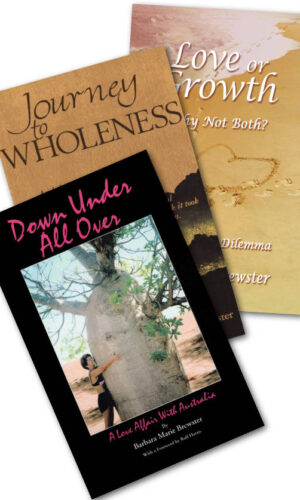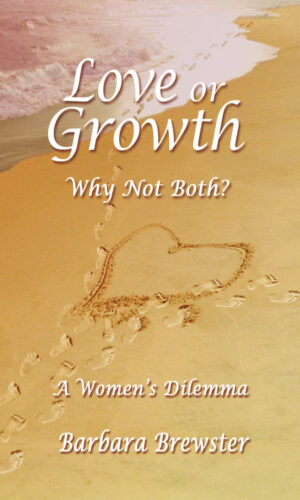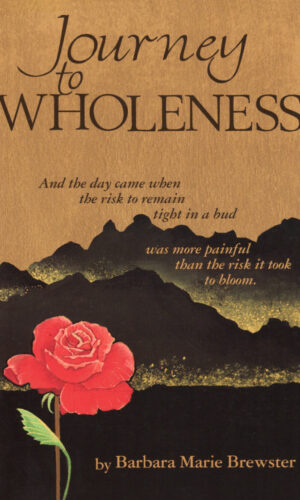Barbara Brewster with Mandy Nolan of the Byron Bay Echo
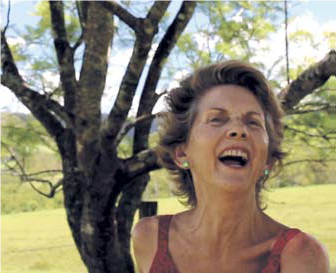 “Barbara Brewster describes herself as a passionate student of life and a spontaneity addict.
“Barbara Brewster describes herself as a passionate student of life and a spontaneity addict.
This inspirational author, speaker, laughter specialist and MS survivor will be presenting a workshop at Starlight Festival this weekend.”
Barbara, tell me about your experience travelling with Patch Adams as a clown – what were the three key lessons or experiences that helped shape your approach?
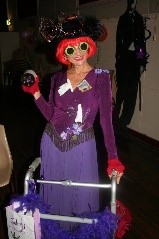 There was no training. You show up. He turns you loose and trusts that you’ll figure it all out. And you do. Caring – or hospital – clowning is not so much about being funny as it’s about being present – saying YES to the ‘offer’ of the moment, rather than having a plan of ‘I am a clown so I’m supposed to behave in certain ways’. The most profound experience was with two young burn patients. They were quivering in pain and fear. When I entered the room Patch and another clown were singing Hush Little Baby Don’t Say A Word to one child. I immediately started singing to the other charred child and doing a little therapeutic touch (non-touching movement of energy), and was deeply moved to see the face and breathing settle, the eyes normalise. I realised something that has stayed with me in all my clown experience. The clown persona is what gets me into the hospital, but sometimes the gig has nothing to do with being funny.
There was no training. You show up. He turns you loose and trusts that you’ll figure it all out. And you do. Caring – or hospital – clowning is not so much about being funny as it’s about being present – saying YES to the ‘offer’ of the moment, rather than having a plan of ‘I am a clown so I’m supposed to behave in certain ways’. The most profound experience was with two young burn patients. They were quivering in pain and fear. When I entered the room Patch and another clown were singing Hush Little Baby Don’t Say A Word to one child. I immediately started singing to the other charred child and doing a little therapeutic touch (non-touching movement of energy), and was deeply moved to see the face and breathing settle, the eyes normalise. I realised something that has stayed with me in all my clown experience. The clown persona is what gets me into the hospital, but sometimes the gig has nothing to do with being funny.
Was it hard? Did it take you time to be able to drop into a continual and ongoing sense of ‘play’ – meaning how do we become less directive and more responsive to stimulus when the human default position is to control the play?
In Russia I don’t think I ever dropped into pure play. For the whole two weeks I was sleep-deprived and in sensory overload, and I was lugging around my fears of ‘doing clowning wrong’ – if you can imagine!
My workshops are a totally different experience. Because I give participants a simple structure and permission, and it’s safe and enjoyable, I am, and everyone is, within the first two minutes, relaxed and connecting and the energy has already changed. By the end of an hour – or more – most everyone is blown away at how simple it is to simply be ‘themselves’ – playful, creative, funny, imaginative. People are generally amazed because they didn’t realise it can be so easy.
What is the power of Yes? Is it as simple as making a mindset change?
As you know, comedy is based on offers and blocks. If you offer me purple pigs with pink polka dots and I, as your comedy partner, say no way, that pretty much ends the story. If, however, I say ‘Yes, AND they danced for the queen’, the story moves forward. Life is the same. It’s giving us offers all the time, most of which we masterfully block. When, instead of resisting the four flat tyres, or the multiple sclerosis, we say, ‘Yes, this is what is, I’ll see where this circumstance (offer) takes me’, then we open the way to move forward with our personal story.
Sometimes it can be a simple mindset change. In my experience, though, there are lots of life offers that I resist. But at least I’m aware of my resistance! Practising the power of yes in fun circumstances such as play/comedy certainly has helped me to develop my awareness of its importance and my ability to use it.
How can this enhance our daily lives?
Eckhart Tolle says it well: ‘Always say YES to the present moment. What could be more futile, more insane, than to create inner resistance to something that already is? … Say YES to life (the offer of the moment) – and see how life suddenly starts working for you rather than against you’ (from The Power Of Now).
How did you develop your workshop?
At 50 I enrolled in a comedy class at Portland (Oregon) State University. I discovered this Barbara who was exuberant! Witty! Riotously funny – along with the other 30 students. I LOVED feeling so alive. I became addicted to meeting with comedy buddies, and enticing anyone who would, to play with me. I couldn’t wait, though, for buddies, so I translated many games on to paper – and my writing changed profoundly.
It became much more imaginative, colourful, poetic, profound. Then the teacher passed out the principles of comedy, and I realised these were the same as the spiritual principles I’d been trying to incorporate into my life. Also, I studied Gelatology – the health benefits of laughter. Everything tied together and I just had to share it.
You have lived with MS. Tell me a little of your healing journey – did the healed become the healer?
I realised immediately that I was being given some sort of “opportunity.” I didn’t like it, but somehow, I mustered the commitment and courage to look excruciatingly honestly at personal myths, misbeliefs, limitations and to actually address them. I did heal and I’ve been billed as a ‘wounded healer’. People who read my book Journey to Wholeness realise they can heal too.
What are the core values that you try to get across in your work?
Every single one of us is loaded with treasures of exuberance, creativity, imagination, whimsy, wit. When workshop participants ‘get’ this–not as theory but as experience–it can be transformative. It’s our birthright to EXpress–instead of DEpress–our inherent treasures. In fact, we MUST express them. Not to express is to whither. Just look around us – at the disease, lethargy, depression, deterioration, dysfunction.
What do you think are the main things that tend to hold people back?
Fear. Fear of looking foolish, fear of not fitting in, fear of standing out, fear of doing it wrong, fear of disapproval, fear of letting go, fear of speaking without thinking, fear that if they are having fun, their customers/clients/family will think they are being irresponsible (this is very common with workshop participants). Also, ‘I don’t have time’.
What should we expect for your workshop at Starlight?
Lots of laughter. Surprise yourself with: (1) your inherent creativity and wit; (2) quickly, easily and enjoyably connecting with a roomful of strangers; (3) effortlessly changing stressed to relaxed energy; (4) physical changes; and (5) deepening self-awareness.

